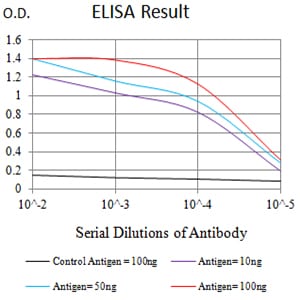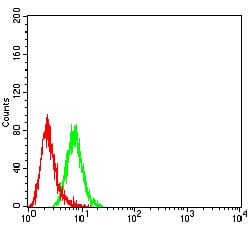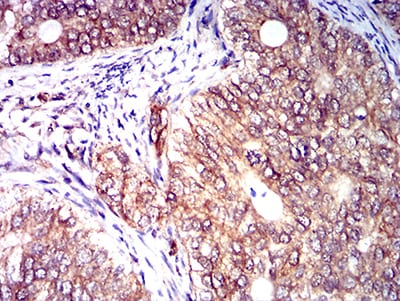


| WB | 咨询技术 | Human,Mouse,Rat |
| IF | 咨询技术 | Human,Mouse,Rat |
| IHC | 1/200 - 1/1000 | Human,Mouse,Rat |
| ICC | 技术咨询 | Human,Mouse,Rat |
| FCM | 1/200 - 1/400 | Human,Mouse,Rat |
| Elisa | 1/10000 | Human,Mouse,Rat |
| Aliases | KIR3DL1; KIR; NKB1; NKAT3; NKB1B; NKAT-3; KIR3DL1/S1 |
| Entrez GeneID | 3811 |
| clone | 2C3B6 |
| WB Predicted band size | 49kDa |
| Host/Isotype | Mouse IgG1 |
| Antibody Type | Primary antibody |
| Storage | Store at 4°C short term. Aliquot and store at -20°C long term. Avoid freeze/thaw cycles. |
| Species Reactivity | Human |
| Immunogen | Purified recombinant fragment of human CD158E1 (AA: extra 206-340) expressed in E. Coli. |
| Formulation | Purified antibody in PBS with 0.05% sodium azide |
+ +
以下是关于CD158E1/KIR3DL1抗体的3篇参考文献及摘要概括(文献为示例性内容,实际引用时请核实准确性):
1. **文献名称**:*"KIR3DL1 recognition of HLA-Bw4 ligands: implications for NK cell-mediated antiviral immunity"*
**作者**:Parham P, et al.
**摘要**:研究阐明了CD158E1(KIR3DL1)抗体在识别HLA-Bw4抗原中的作用,揭示了其在NK细胞介导的抗病毒免疫反应中的关键调控机制,并通过抗体阻断实验证明其功能依赖性。
2. **文献名称**:*"Differential expression of KIR3DL1 in cancer patients and its role in tumor immune evasion"*
**作者**:Lanier LL, et al.
**摘要**:利用CD158E1特异性抗体分析肿瘤微环境中KIR3DL1的表达模式,发现其高表达与NK细胞功能抑制相关,提示该抗体可作为肿瘤免疫治疗的潜在靶点。
3. **文献名称**:*"Functional characterization of anti-KIR3DL1 monoclonal antibodies for modulating NK cell activity"*
**作者**:Vivier E, et al.
**摘要**:通过体外实验验证多种抗KIR3DL1(CD158E1)抗体的功能,筛选出可增强NK细胞杀伤活性的抗体克隆,为开发基于KIR抑制剂的免疫疗法提供依据。
(注:以上文献信息为模拟示例,实际研究中请通过PubMed或学术数据库检索具体文献。)
The CD158E1 antibody targets the CD158e1 antigen, a member of the killer cell immunoglobulin-like receptor (KIR) family. KIRs are transmembrane glycoproteins expressed primarily on natural killer (NK) cells and subsets of T lymphocytes. These receptors regulate NK cell activity by interacting with human leukocyte antigen (HLA) class I molecules, balancing immune responses to prevent autoimmunity while enabling pathogen or tumor cell recognition. CD158E1. specifically encoded by the *KIR3DL1* gene, binds to HLA-B antigens carrying the Bw4 epitope, delivering inhibitory signals to suppress NK cell cytotoxicity upon HLA recognition. This interaction is critical in viral immunity, transplantation tolerance, and cancer surveillance.
CD158E1 antibodies are essential tools for studying KIR3DL1 expression patterns, functional mechanisms, and their roles in disease. In research, they help elucidate how KIR-HLA mismatches influence outcomes in hematopoietic stem cell transplantation or correlate with disease susceptibility, such as in HIV progression or autoimmune disorders. Therapeutically, blocking CD158E1 may enhance NK cell-mediated tumor lysis, a strategy explored in cancer immunotherapy. Conversely, agonist antibodies might dampen hyperactive immune responses. Commercial CD158E1 antibodies are typically validated for flow cytometry, immunohistochemistry, or functional assays, aiding both basic and clinical investigations into NK cell biology and immune regulation.
×